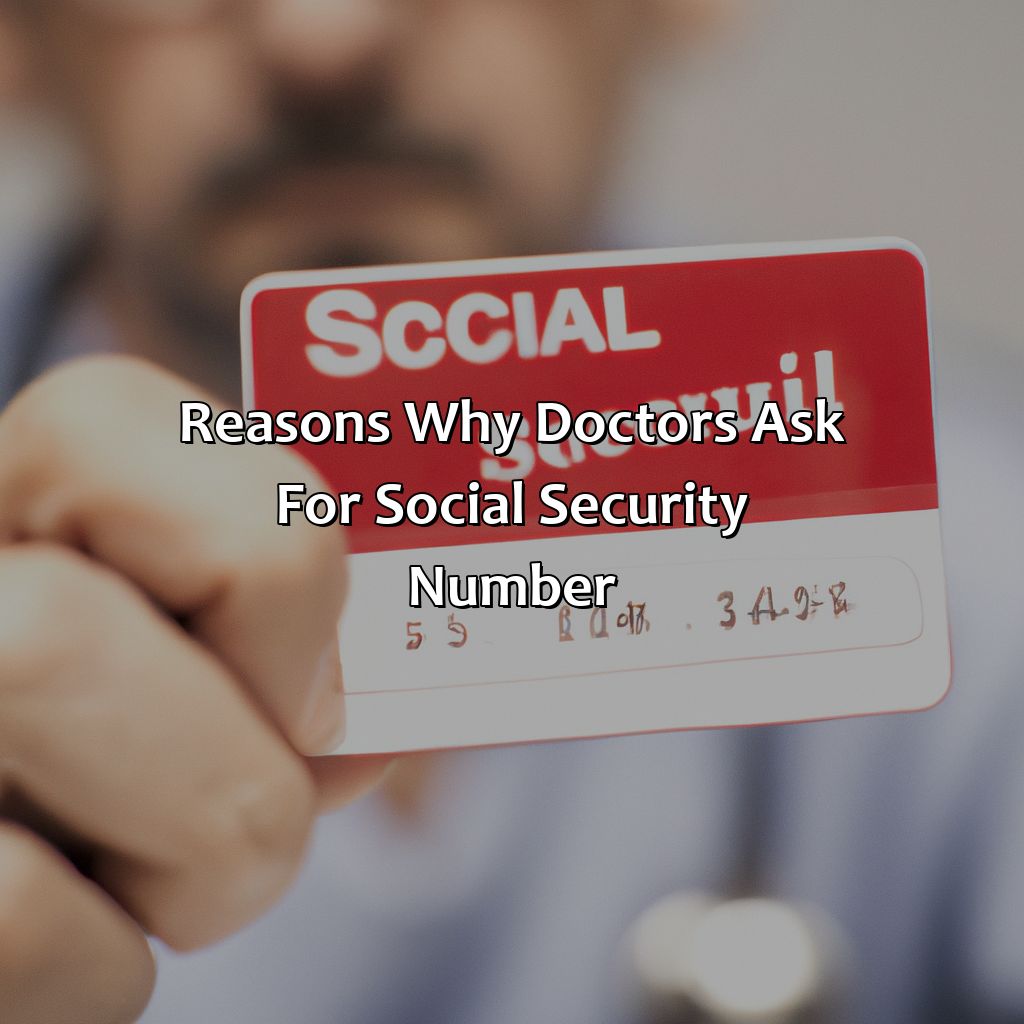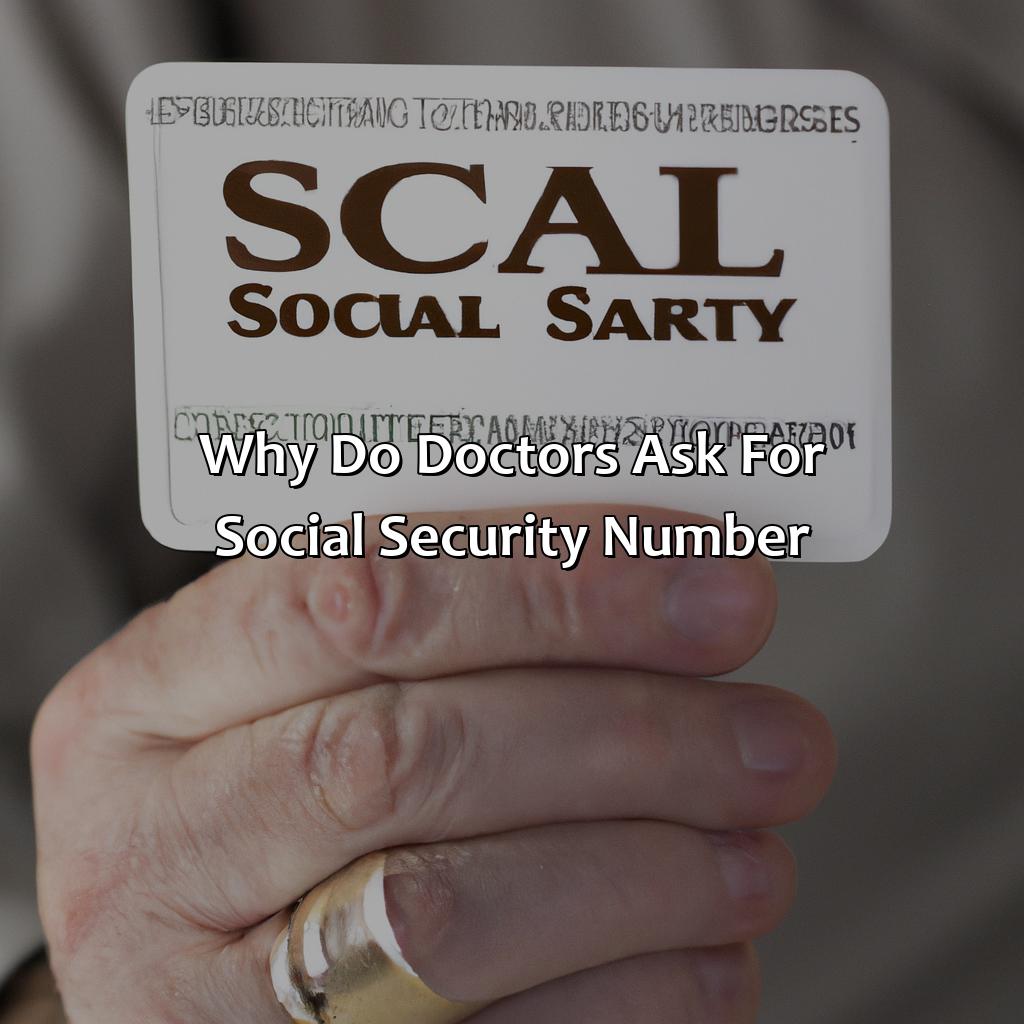Why Do Doctors Ask For Social Security Number?
Key Takeaway:
- Doctors ask for social security number for financial and billing purposes, which helps to accurately bill the patient or their insurance provider for services rendered.
- Social security numbers are also used for identification and verification purposes to ensure the patient is who they claim to be, and to improve the accuracy of medical records.
- Protecting personal information is vital for healthcare providers, and social security numbers are subject to HIPAA laws to prevent unauthorized access to patient information and to prevent identity theft.
Are you wary of why doctors ask for your social security number? You might be surprised to learn the important role it plays. Uncover the truth behind what healthcare providers use your data for and how it impacts you.
Reasons why doctors ask for social security number
Why do doctors ask for your social security number? There’s a lot of reasons. Your SSN is needed for financial and billing matters, identification and verification, plus insurance for healthcare. It’s all part of the process for managing your healthcare correctly.

Image credits: retiregenz.com by James Woodhock
Financial and billing purposes
For administrative and billing purposes, healthcare providers may request a patient’s social security number. This information assists in identifying the patient and ensuring that their health insurance plan is appropriately billed. It may also be necessary for submitting claims to government programs like Medicare or Medicaid. Patients should feel confident that their personal information is kept secure and confidential.
Additionally, social security numbers may aid in tracking patients’ medical histories and coordinating care across multiple facilities. As healthcare technology advances, it becomes increasingly important to accurately identify patients and ensure continuity of care.
Pro Tip: Patients should always verify with their healthcare provider why their social security number is needed, what steps are being taken to protect the information, and if providing alternate forms of identification is an option. Even hackers need to confirm their identity before stealing your medical records.
Identification and verification
Healthcare providers require identification and verification of patients’ personal information for medical services, which includes requesting their identity and relevant data. Social Security Number is one of the critical identifications that doctors need to access patient records quickly and efficiently. Doctors can use your SSN to track your medical history, credit history or verify insurance coverage much faster with increased accuracy. Protecting this sensitive data remains a priority as an SSN represents an individual’s unique identifier that connects them with previously linked healthcare providers from other locations.
Furthermore, Social Security Administration (SSA) issues an advisory notice to report often as all but essential divulgence of Social Security numbers in recent years due to identify theft problems. Despite this advisory notice, some clinics still require SSNs along with more secure identities for client records.
In reality, doctors faced a severe limitation when attempting to quickly surface every patient’s information in previous eras until digitisation and record-keeping overtook paper charts. This approach evolved into a streamlined system where physicians could see and evaluate if any outstanding medical debt concerns related to specific patients by inputting the unique identifier of their SSNs during check-ins.
An American woman named Jacqueline Benton Sandmann sued her OB/GYN doctor when an employee viewed her file that showed her full name, address, social security number, marital status and health records on Facebook. After her first prenatal visit to Cedar Park Women’s Center in Texas in 2011 she asked about “who she needed to pressure” to change the clinic’s privacy procedures relating to social media sites like Facebook after receiving shocking news months later that Dr Evan Voyles providing professional care discussed her details on Facebook with his family members violating privacy protection’s law known as HIPAA law between 18 November and 7 January of 2011-2012 she filed a lawsuit for compensatory damages and legal fees against him and the owner of the clinic according to court documents obtained by Forbes magazine journalism work published in 2013.
Insurance is like a bad boyfriend, they only want your social security number when they need something from you.
Insurance
Medical Care Coverage
Doctors often ask for your social security number because it is linked to your medical care coverage. Insurance companies require this information to confirm your eligibility and provide coverage. It also helps doctors identify you and track your medical history for better care.
In addition, some insurance plans utilize a social security number as a member identifier that physicians must use when submitting claims. Without it, the healthcare providers may not receive payment for their services rendered.
It’s necessary to understand that medical care coverage differs depending on the type of plan or insurer and providing social security numbers usually expedites claims processing. Therefore, make sure to carry your card with you every time you visit a provider.
Don’t risk potential claim issues or inaccurate billing information by failing to provide vital insurance details, ultimately placing yourself at financial risk. Remember, having appropriate coverage reduces stress during trying times.
Your social security number is like your virginity- once you give it away, it’s gone forever, so make sure your doctor is worth it.
Protecting personal information
To guard your info, like your social security number, doctors take action. They stick to HIPAA laws and concentrate on halting identity theft to keep their patients’ privacy safe.

Image credits: retiregenz.com by Harry Arnold
HIPAA laws
Health data privacy regulations have been implemented through federal laws in the US. These guidelines are known as HIPAA (Health Insurance Portability and Accountability Act) regulations. It is important for medical professionals to protect their patients’ personal information by abiding by these regulations. HIPAA ensures that patients have control over who has access to their health information, protects against fraudulent use of this data, and regulates how healthcare providers can share data.
Medical practice requires doctors to collect personal information from their patients, such as social security numbers. This is a crucial step towards ensuring that healthcare providers comply with HIPAA laws while safeguarding sensitive patient data from unauthorized use or access by malicious individuals or organizations.
It’s worth noting that HIPAA is not just about protecting a patient’s personal data as it pertains to healthcare records exclusively; it also protects all types of identifiable health information, including conversations with medical professionals and payment transactions. Any part of a patient’s visit can be made confidential under HIPAA.
Patient confidentiality is essential, and HIPAA regulations help maintain it. It can be challenging for some people to provide sensitive information like SSN’s to a new healthcare provider because they might not understand why it’s needed. In one case, a patient refused to provide her SSN because she believed that disclosing it was unnecessary unless she was applying for credit or borrowing money. Her concern was clarified when the provider explained how gathering the number would help verify her health care coverage benefits accurately.
Protecting your identity is like trying to hide a pea in a haystack, except the pea is your personal information and the haystack is the internet.
Identity theft prevention
Hindering duplicity of personal data has become a primary concern publicly and privately. Doctors asking for Social Security Numbers is a measure to prevent identity theft. It enables verifying insurance and confirming patient identity for medical record purposes.
This process reduces the risk of fraudulent activities by ensuring that the person seeking medical help is who they claim to be. The system also helps avoid confusion and mix-ups with another person’s care or records. Additionally, it makes medical paperwork easier by having one unique number linked with each patient.
Even though doctors require SSNs, individuals must remain vigilant of any unwarranted activity such as unsolicited phone calls, emails or transactions in their name. Monitoring credit reports regularly amid growing instances of data breaches can help keep confidential information from falling into the wrong hands.
Interestingly, research shows that only five states demand doctor offices to file reports of patient data breach incidents as most other states don’t necessitate it by law. This loophole in protection has led to trends indicating rising cases of breached data annually.
Some Facts About Why Do Doctors Ask For Social Security Number:
- ✅ One reason doctors ask for social security numbers is to accurately identify patients and prevent medical identity theft. (Source: U.S. News & World Report)
- ✅ Social security numbers can also be used to check patient eligibility and process insurance claims. (Source: Health Affairs)
- ✅ In some cases, doctors may be required by law to collect social security numbers for medical or Medicare billing purposes. (Source: HealthCare.gov)
- ✅ Social security numbers may also be used for research purposes with patient consent and appropriate privacy protections. (Source: National Institutes of Health)
- ✅ Patients have the right to refuse to provide their social security number, but it may impact insurance coverage and billing processes. (Source: American Medical Association)
FAQs about Why Do Doctors Ask For Social Security Number?
Why do doctors ask for social security number?
Doctors ask for social security number for the purposes of verifying a patient’s identity, protecting against insurance fraud, and ensuring accurate medical record keeping.
Is it required to give my social security number to the doctor?
While it is not required to give your social security number to the doctor, it is highly recommended as it helps to identify and verify the patient’s identity, ensuring safe and effective healthcare.
What happens if I do not provide my social security number to the doctor?
If you do not provide your social security number to the doctor, they might have difficulty verifying your identity, which can cause delays in healthcare services. Additionally, some insurance providers may require the social security number for processing claims or determining eligibility for certain benefits.
How is my social security number protected once I provide it to my doctor?
Your social security number is protected by the Health Insurance Portability and Accountability Act (HIPAA) laws, which require healthcare providers to keep your personal health information, including social security number, confidential and secure.
Can my doctor share my social security number with anyone else?
Your doctor is required to keep your personal health information, including social security number, confidential and can only share it with authorized individuals, such as other healthcare providers or insurance companies, with your explicit consent.
What should I do if I suspect my social security number has been compromised by my doctor?
If you suspect your social security number has been compromised by your doctor, you should immediately contact the office and file a complaint with the appropriate authorities, such as the Federal Trade Commission (FTC) or the Department of Health and Human Services (DHHS).
